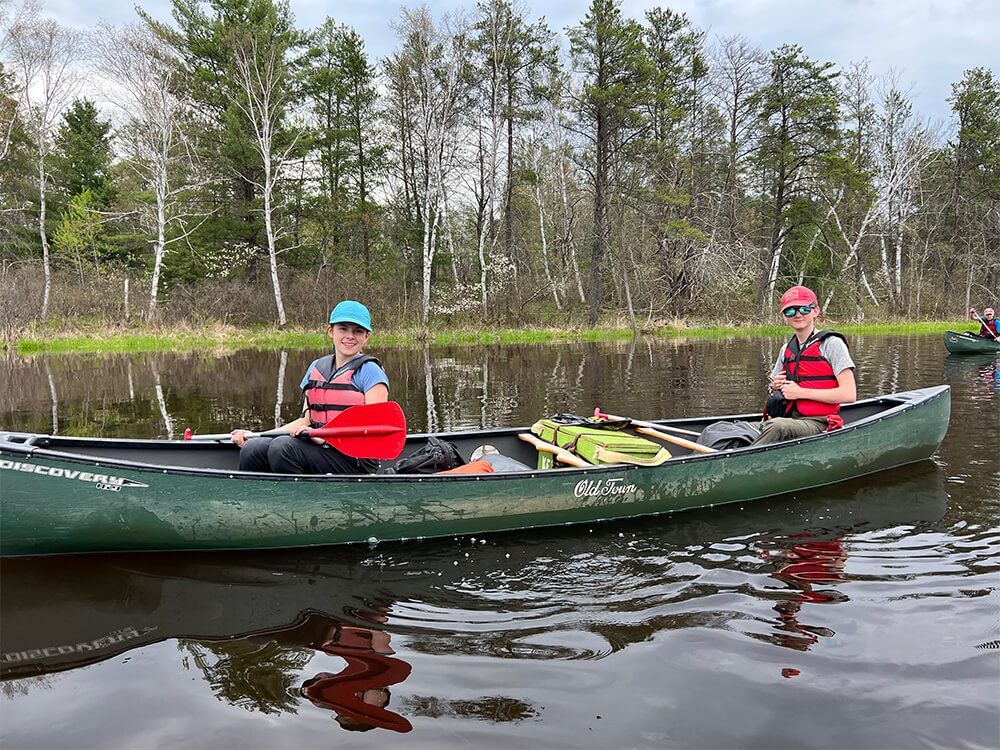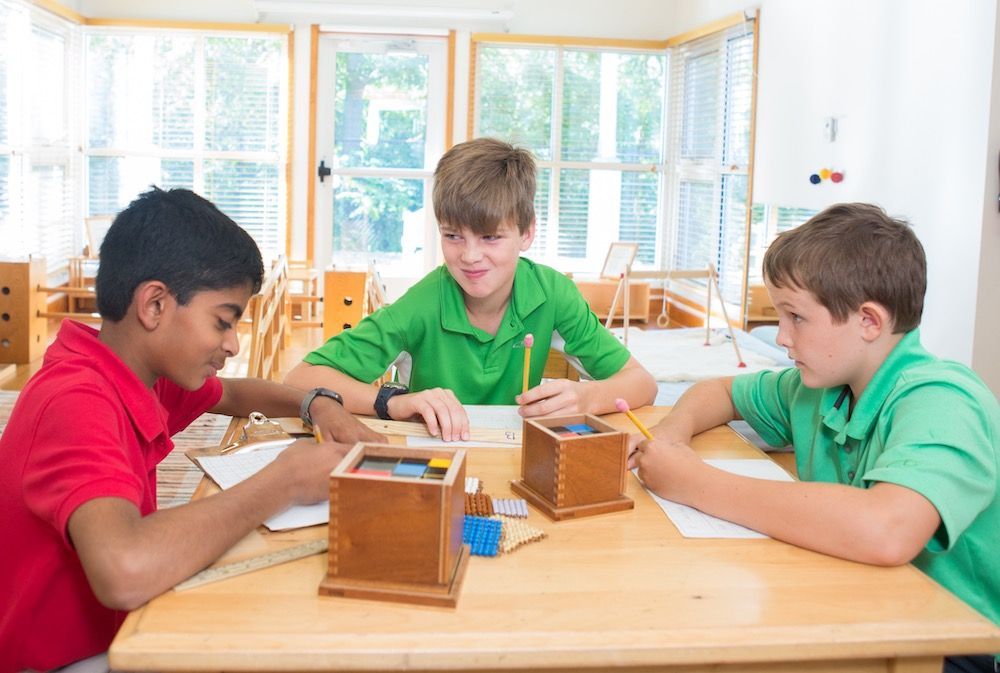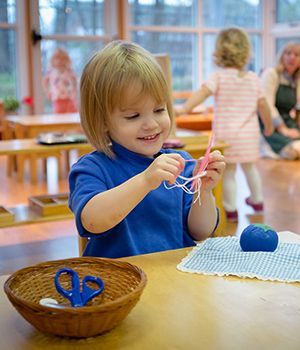
What is Self-Mastery?
The importance of being in control of ourselves has changed over the last sixty years. Before the 1950s, parents had a basic, unquestionable belief that control over oneself was of the utmost importance. They raised their children with this as a priority. After the 1950s, with the advent of a deeper psychological understanding, parents began to attend more to their children’s emotional lives. They showed more warmth and affection and encouraged self-expression. While there are many positive effects of this shift in focus, it also has had a negative effect. As self-control has dropped in our culture’s priorities, self-mastery has fallen with it.
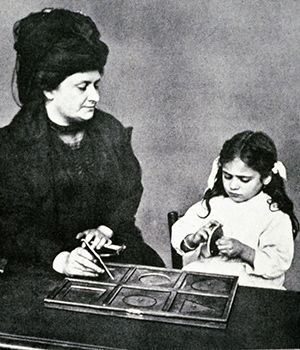
Dr. Maria Montessori was deeply aware of the importance of self-mastery. She wrote, “We claim that an individual is disciplined when he is master of himself and therefore he is capable of controlling himself when it is necessary to comply with the law of life” (Montessori, 1967, p. 49).
Having self-mastery means being physically and emotionally regulated. It means being able to control desires and urges in order to achieve plans and dreams. It means knowing that we cannot have whatever we want.
Dr. Montessori had incredible self-mastery. While she loved life, family, food, and the world around her, she was not sentimental. She was a scientist, a medical doctor, and an extraordinary observer. She maintained discipline about her work, was humble in the service of children, and submitted herself to exile during the Great War with grace and perseverance. She was a true realist.
People who encounter the graduates of a Montessori program often observe, “They know themselves so well, and they always know how to handle themselves, even in difficult situations.” This is self-mastery. Knowing yourself, knowing your limits, and setting realistic goals—high enough to be worthy, but not so high as to be impossible.
Why Does Self-Mastery Matter?
We must have some degree of self-mastery in order to meet our goals, live within a community, maintain healthy relationships, and care for our children physically and emotionally.
People who never develop self-mastery will eventually fall apart. They may make it through school and even early adulthood, as long as the path in front of them is clear. But when there are serious obstacles, or even simply space for them to have to make their own choices, they will not be able to do the work and reflection necessary to guide their actions. They may act out, or they may collapse. This crisis will look different for every person.
We need self-mastery as a society because this is how we will move forward in a productive way. We need people who are able to make good decisions every day, people who are able to maintain perspective, and people who are able to recognize both the importance and the limits of their place in the world, whatever they may be.
Montessori did not intend to change human nature. She knew that the human spirit did not need to be altered. She was intent on changing attitudes about children so that they could develop to their full innate potential. She believed that every human had essential gifts to offer this world. Self-mastery allows us to use all the gifts we have been given. Every person is entirely new. They have never been before and never will be again. There is one opportunity for each individual self to contribute to the world. This is why self-mastery matters.
The Adult First Masters Himself
We are the model for our child. When we have self-mastery, we reflect this in our actions and words around him or her. Our children see all the small and large ways that someone lives a life of self-mastery. They absorb our mental hygiene, whether it is healthy or unhealthy, and it becomes a part of who they are.
We must know ourselves well enough to know what we need to work on. We had our own parents who gave us their mental hygiene. We all have to deal with the values, beliefs, and behaviors that are basic to us because of our upbringing. We must know our strengths and weaknesses. Self-mastery means that we are able to work with all of who we are. We must know when we need more discipline, and we must know when we need to learn to be flexible. We may need to master disorganization, anger, excessive emotions, neediness, and perfectionism, among others.
Self-mastery does not mean perfection. No human being is perfect, and this is not the goal anyway. We live in an affluent society. Most of us do not endure the question of physical survival on a day to day basis. While this is unquestionably a better way to live, it also means that we will have a tendency to turn to the fallacy of human pride, and assume that we are capable of perfection. Our goal as parents and leaders is to understand the fullness of our personality--our strengths and weaknesses--and to be able to work from there.
After our 20s, we should have the equipment to master ourselves. It can take almost 30 years of life before we have even developed the mental capacity for true mastery. It is a process and for many people, this may require therapy. For others, it takes honest friendships, time for reflection, and an ongoing desire to learn about yourself in the context of the world.
In a marriage, the work is done along with the other spouse. It is how we learn to relate with true intimacy. We grow and develop with this person over the course of many years, and our mastery (along with his or hers) will serve the health of the marriage--because it is what ensures that we are able to cooperate, compromise, and collaborate.
Anyone in a position of influence needs to develop mastery-- whether the influence is small (such as within a family) or large. All great leaders have to learn to control themselves--For example, even George Washington had to learn to control his temper! A leader must be able to stay with a goal. They set an example and are not narcissistic. A leader does not need to be perfect, but without being in control of oneself, they will be unable to rally a group of people towards a larger goal. Prejudices and biases and desires will have too much of an effect on actions and words.
This kind of control is more complicated in today’s world because of the mass influence of technology. We have to master ourselves on so many platforms (interpersonal, social media, email, texting, etc). We can have an influence on others from the privacy of our own living room! All of this produces a larger negative effect on those affected by our influence. Technology has much potential for good. The call is to be vigilant. We must use it wisely and with self-restraint.
How Does the Montessori Curriculum Support Self-Mastery?
Dr. Montessori recognized the importance of self-mastery and created a curriculum and environment that supported it. Her method was revolutionary in its approach to both teacher training and children’s development.
The Teacher Training
The Montessori teacher training program is one of the most rigorous programs in the world. Montessori expected that her teachers would undergo a “transformation” during their training. This takes a long time and requires many hours of observation, practice, and study. During this time, teachers come to self-mastery. She wrote:
"This method [of education] not only produces a reformed school but above all a reformed teacher, whose preparation must be much deeper than the preparation traditionally offered. […The] mission is to be a scientist and a teacher: a teacher in the sense of an observer who respects life, drinking in the manifestations and satiating [the] spirit. Hence it greatly raises the personality of the teacher" (Montessori, 2013a, p. 276).
And also:
"It is not so easy to educate anyone to be a good teacher. It is not enough to study at a university. Perfection is a part of life; in order to achieve it, we must make a long study. Conversion cannot come to everybody. We must patiently try to understand and act on our understanding. Our conversion must be in the heart" (Montessori, 2012, p. 26).
Montessori saw that in order for teachers to support children fully in their development, their first task was their own transformation into self-mastery.

Opportunities for Concentration
A child in a Montessori Young Children's Community chooses sewing workMontessori observed that self-mastery arose when children had the opportunity to concentrate. She wrote:
“Discipline is born when the child concentrates his attention on some object that attracts him and which provides him not only with a useful exercise but with a control of error. Thanks to these exercises, a wonderful integration takes place in the infant soul, as a result of which the child becomes calm, radiantly happy, busy, forgetful of himself and, in consequence, indifferent to prizes or material rewards” (Montessori, 1995, p. 264).
Concentration is the key to self-mastery. This occurs when the body and the brain are working in complete harmony. The brain develops the way it is used. As children have more and more opportunities to concentrate, their brains develop in this integrated, harmonious way, which leads to self-mastery.
This is more than just a theory for Montessori classrooms. It is a practice. When people tour the Young Children’s Community and see one- and two-year-olds exhibiting deep concentration, productivity, and peace, they are in awe. They don’t want to leave the classroom because they cannot believe their eyes!
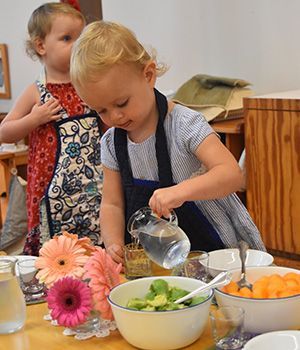
Independence
In the Montessori classroom, children learn to do for themselves. They take care of the classroom. They learn academic concepts from their own exploration with the materials and not from the teacher. This gives children a sense of competence. Competence and true confidence bring about self-mastery.
Freedom and Responsibility
This is a key of the Montessori environment. Children have appropriate freedoms balanced by responsibility. They may make many choices for themselves, bound by the natural laws of living in a community. They may move freely, but not interfere with another’s work. They may choose which work to do, but they may not choose not to do any work for long periods of time.
Freedoms
Freedom of movement: This is an essential element of self-mastery. How can children learn to discipline their bodies if they do not have freedom to move? They will bump into things, they will drop materials, they will bump into other people, they will walk too fast, and they will stumble. All of these physical experiences will refine their sense of control from the inside. They will enhance their mastery of themselves.
Choices: There are many opportunities to practice making choices. Choices of what to work on, how long to work on it, where to sit, what to study, what to read. Every time children make a choice, they experience what it feels like to live with the consequences of their own actions.
Responsibilities
Community: The responsibility the children have is to operate as productive members of their community. All of their freedoms fall within these boundaries. Living in a community is a natural way to encourage self-mastery. Ultimately, this will allow them to enter society at large independently. The classroom mimics a small community and gives the children plenty of opportunities to experience the natural boundaries of what this means-- not being disruptive, taking care of materials and the classroom, and having ownership of one’s physical body. Here, they will learn, “My rights end where your rights begin.”
What Can You Do at Home?
We lay the foundation for our children now. This process will finish in college and later. Today’s work plants seeds that will not be sown for decades. The same principles that apply in the classroom work for children at home:
Opportunities for Concentration

Practical life activities appeal deeply to young children. They see us engaging in self-care and care of our homes. They want to do this work, and they want to use their whole bodies. We can have real tools available so children can participate in this—a small broom, a small mop, a little sponge, a collection of washcloths in a basket. We can show them how to use the tools (one at a time!), and then give them opportunities to do that work in our homes, usually alongside a parent or caregiver. Remember that young children are not interested in the product. They will use the broom inefficiently, and they may spread water around more than actually cleaning it, and that is fine! A child’s purpose here is not to do it well. That is our purpose. Theirs is simply to do it. If they are doing the work, and they are concentrating, let them be. Over time, they will develop their skills and be able to do the work effectively and successfully.
There are many other prolonged activities we can do with children to support their self-mastery—washing potatoes, cutting apples, baking, washing dishes, polishing silver. All of these activities can be simplified appropriately for children of different ages. See Montessori From the Start by Paula Polk Lillard and Lynn Lillard Jessen for ideas of how to modify activities in the home for children.
The important thing for us is to find activities that we already have to do, and preferably that we also enjoy doing! Someone who does not like cooking can include children in gardening activities, or chores in the yard, if that is a place of enjoyment and relaxation. Children are very sensitive, and they absorb the nuances of our emotions and nonverbal communication that we are not even aware that we are expressing. Of course we have many jobs around the house we don’t want to do, and of course we can find ways to include our children in those jobs. But it is the work that we enjoy doing where our children will understand that work is pleasure.
Independence
Montessori taught us to consider the child as though they were asking, “Help me to do it myself.” This involves all the ways we let our children contribute to their own care and the care of the house. A true sense of competence arises when children see that they can do it on their own. This means that when babies are very little, we can talk to them as we dress them so they know what to expect and they understand that dressing is not something that happens to them. It means that when a baby is making an effort to reach a toy, we do not intervene and hand it over right away. We let the baby struggle a little and eventually work towards doing it independently. It takes observation and patience to time our intervention properly for our children’s benefits. It means that when toddlers are able to walk, we let them walk rather than carry them, whenever the conditions are appropriate. It means that our children have a chance to brush their own teeth before the parent has their “turn.” Independence translates to almost all aspects of self-care for children. We can think about all the things we do for them, and consider the ways we can slow down, show them how to do it themselves first, and give them turns. We do not want our children to develop the idea that we are their personal servants. Seeing that they are able to do it themselves will encourage their independence and give them a sense that they are masters of themselves.
Freedom and responsibility
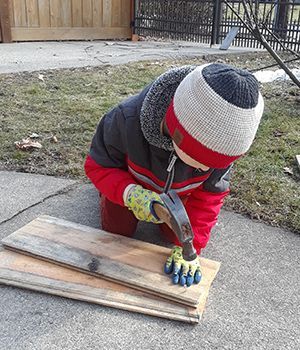
Just as in the classroom, children’s freedoms at home will be balanced by responsibilities. They may play in the yard, if they don’t run into the street. They may walk in the parking lot, if they hold their caregiver’s hand. They may look at books, as long as they do not tear the pages. These are the boundaries of discipline that are built into everyday life. And here, the goal is to have the appropriate balance of freedom and responsibility. Which means: Do not have more boundaries than are necessary. For example, letting a child climb on a chair and see how it feels to fall is okay as long as no serious injury will occur. Imposing limits so that a child will not be mildly hurt is excessive and takes away the ability to learn for oneself. Similarly, do not allow more freedoms than necessary. Choosing between 10 shirts to wear to school is too many! A young child’s mind can handle two choices, maybe three, and sometimes no choices. This is a shifting balance between freedom and responsibilities or boundaries. It will change depending on a child’s age, their mood, the actual environment, and the schedule on that day. Some of finding this balance will come naturally to us, and our own self-mastery helps us with the parts that do not come easily. It requires observation, and sometimes a great deal of energy to determine what the balance is in any given moment. But it is worth it. Establishing this balance is one of the keys for children to develop their own self-mastery.
Final Thoughts
The ability to attain self-mastery makes us human. Animals do not have this kind of self-awareness, nor the tendency to continue to improve in life. It is a gift and a responsibility that we must attend to. It promises that civilization will continue to develop. It gives us a chance at peace. It grants wisdom and hope to future generations.
Montessori, M. (1967). The discovery of the child. New York: Random House.
Montessori, M. (1995). The absorbent mind. New York: Henry Holt and Company.
Montessori, M. (2012). The 1946 London lectures. Amsterdam: Montessori-Pierson Publishing.
Montessori, M. (2013a). The 1913 Rome lectures. Amsterdam: Montessori-Pierson Publishing.
References
